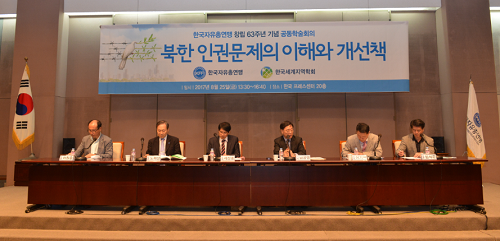It has been suggested that the South Korean government needs to separate efforts for dialogue with North Korea from domestic political considerations and pursue a consistent policy on human rights matters in accordance with universal values and the spirit of the constitution. President Moon Jae In has made dialogue with the North a priority, but the regime has responded with extreme sensitivity to the human rights issue.
“Rather than becoming bogged down in the domestic political arena, we need to focus on the North Korean human rights issue and decide on a policy direction that makes sense. We need to move towards a consistent policy in line with universal principles,” said Professor Lee Ki Wan, an international relations scholar from Changwon University.
Speaking from the lectern at the joint conference, Professor Lee continued, “From the perspective of the international community, the early stage of South Korea’s handling of the human rights issue appears conflicted, and has been affected by domestic politics.”
“America approaches the situation by integrating security and human rights. The US simultaneously addresses North Korea’s nuclear and missile tests as well as their human rights violations. On the other hand, South Korea’s liberal governments have pursued a lackluster approach to the human rights problem because they are concerned about North Korean resistance. The South’s conservative governments have tended to distinguish and separate the North’s human rights problems from the North-South relationship,” Professor Lee said.
Chung-Ang University School of Law Professor Jae Seong Ho added, “Moon Jae In has mentioned solving the North Korean nuclear problem peacefully and improving the human rights situation, but the two are separated into different tracks. We don’t know how much time and energy will be devoted to security and human rights matters while reunification is pursued.”
“It is not right to deprioritize the human rights issue in the hopes of conducting exchanges and securing cooperation from the North. The basis for the South’s human rights policy should be universal values and the spirit of the South Korean constitution,” Professor Jae continued.
The panel asserted that the fundamental cause of the human rights problem in the country springs from the attributes of the regime. Therefore, serious progress for human rights will require driving forces for regime change. This assertion is contrary to strategies aiming to assure the regime that it will be accepted and financial support may be issued in pursuit of denuclearization.
On this point, Professor Lee noted, “It actually appears that the North’s human rights situation has deteriorated since Kim Jong Un came to power. Inherent to the continued survival of the regime and the power structure is North Korea’s ‘very own take on human rights.’ To put it another way, the origins of the human rights problem is fundamentally tied to the nature of the regime, so the only way to truly solve the human rights problem is by soliciting changes to the government.”
Korea Freedom Federation spokesperson Yang Il Kuk added, “The inherent root of North Korea’s human rights violations is its dictatorial ruler, and the far-reaching corruption and economic control of the authorities. The optimistic solution to these problems is the democratization and marketization of North Korean society.”
“If we don’t properly concern ourselves with North Korea’s systematic human rights violations and give economic assistance without scrutiny, it is likely that these provisions will be used to enrich the regime, arm the military, and worsen economic stratification. These outcomes conflict with the long term goal of North Korea’s opening, reform, freedom, and unification,” Yang continued.
In relation to this, the panel urged the South Korean government to integrate programs that aim to increase the social well-being and personal freedoms of North Koreans when formulating its human rights policy.
To date, programs focused on improving social welfare and individual freedom have been considered separately. Social health advocates have focused on humanitarian aid, while freedom advocates have focused on the introduction of external information to open up the minds of North Koreans. But now, the panelists argue, is the time to consider the two in a holistic context.
“In order to improve North Korea’s human rights situation, we need to establish an integrated framework that improves the quality of the residents’ socioeconomic lives by bringing together society-oriented policies with freedom-oriented policies based on the North Korean Human Rights Act [passed on March 30, 2016 in the National Assembly]. It is also necessary to include provisions related to food security and public health in the long term roadmap,” Catholic Kwandong University Professor Lee Won Ung said.
On the prospect of humanitarian aid, Professor Lee said, “We need to steer clear of political negotiations that exclude residents and lack clear provisions for delivering aid to the populations in need. Instead, we need to precisely identify the recipients of the aid, ensure accessibility, and clarify the distribution methods. It’s important to use consultation with local farmers and medical teams to determine the needs before devising an effective program.”
“An ideal program would not only punish those who have committed human rights violations, but also use incentives to induce positive change. The typical example of this is that there is no humanitarian aid unless it addresses North Korea’s vulnerable class,” Professor Jae added.
“Using interactions with the North Korean people as a basis, the government should prepare a master plan for addressing the human rights problem and proceed in a systematic fashion. The policy should focus on vulnerable populations such as infants, the disabled, and pregnant women. It should also improve conditions and the timing of the aid by considering the fact that large, yearly aid shipments have tended to lead to tension and conflict,” Professor Jae concluded.


















